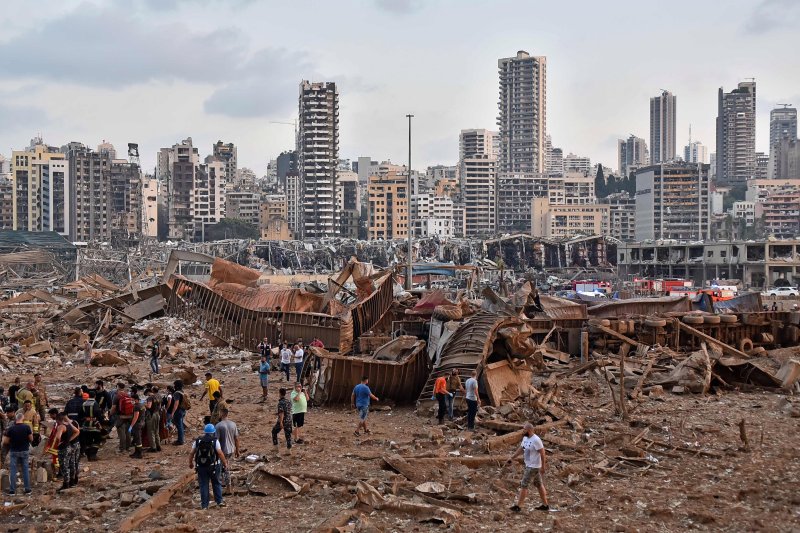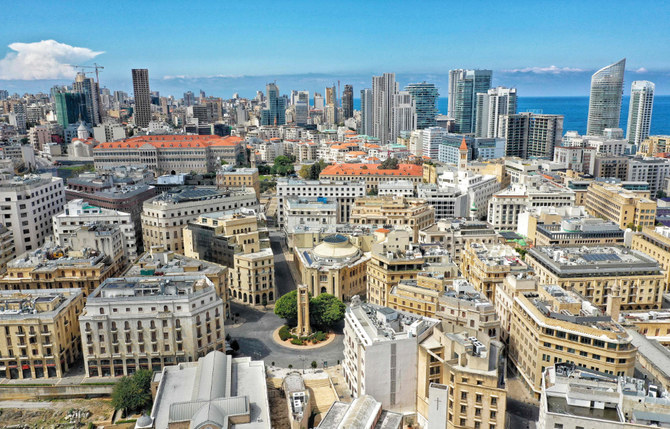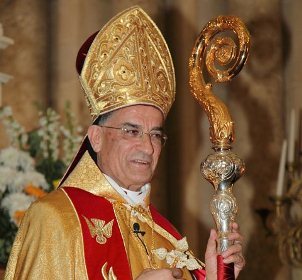
By NAJIA HOUSSARI -- arabnews.com -- BEIRUT: Officials from charitable organizations and imams at mosques in Lebanon have raised concerns about their reduced ability during Ramadan this year to help the growing number of people going hungry, as a result of the effects of the financial crisis in the country. They said costs have risen sharply in the past year, fewer people are volunteering and donations from “capable people” are in decline because the “conditions of benefactors have changed.” The economic crisis has created harsh living conditions for many, as a result of which the number of families in need of assistance has increased. Meanwhile, the amount of donations received during Ramadan by charities and other groups that provide assistance is expected to fall, which will affect their ability to provide daily iftar meals for the growing numbers of people who are struggling.
FASTFACT
Faten Mneimneh from the Islamic Charitable Guidance and Reform Association told Arab News that because of the financial constraints and fewer volunteers the quality of iftar meals will be lower and less varied during Ramadan this year, at a time when growing numbers of people are going hungry. Such a meal traditionally includes a fattoush salad and a plate of rice and meat. Last year the cost of a single meal was about 50,000-60,000 Lebanese pounds, which is about $33-$40 based on the official exchange rate of about 1,500 pounds to the dollar.

by gulf-times.com -- Lebanon won’t be able to deliver many if any reforms sought by the IMF as conditions for a funding deal before an election in May, two lawmakers said, meaning months could go by without action as that vote may well be followed by political limbo. The International Monetary Fund announced the draft funding deal on Thursday, but said its board would not decide on whether to approve it until Beirut enacts a batch of reforms including measures which ruling factions have long failed to deliver. An IMF agreement is widely seen as the only way for Lebanon to start emerging from what the World Bank has described as one of the world’s worst ever financial collapses — and the deepest crisis since Lebanon’s 1975-90 civil war.
Many analysts have expressed renewed doubt that Lebanon’s fractious parties can deliver reforms they have long been unwilling or unable to agree to, even as Lebanese leaders have hailed the IMF deal and vowed to make it succeed. The parliamentary election is seen as another complicating factor. After the vote, a new government must be formed, a process that usually takes many months during which the outgoing cabinet acts as caretaker and cannot take major decisions. Nicolas Nahhas, a lawmaker and adviser to Prime Minister Najib Mikati, noted there were only a few weeks left before the election and MPs were busy campaigning. “This wasn’t meant to be done in a few weeks and nobody serious would say it should be done in that time frame,” he said of the reforms. “The agreement is a kind of benchmark of what should come after elections. So, after elections, parliament will start studying quickly these actions and then we shall see how we go forward.”

By Mona Alami -- arabnews.com -- RIYADH: The recent Lebanese court order restricting lenders from moving money abroad is the fallout of deep rot long building in the banking sector. This comes on the back of the country’s mounting debt amidst the deteriorating economic condition – the crisis that many blame on Lebanon’s corrupt political class and the government which defaulted on repaying the debts to banks. On March 24, Lebanese judge Ghada Aoun ordered the Lebanese customs administration to prevent six Lebanese banks from sending money abroad. The banks targeted were Bank of Beirut, Bank Audi, Creditbank, Bankmed, SGBL and Blom Bank. “Lebanese banks are technically broke, but until this moment, they aren’t legally so,” said economist Roy Badaro in an interview with Arab News. He explained that the word ‘illiquid’ might be more appropriate as no one really knows about banks’ possible undeclared assets. In addition, no Lebanese bank has so far officially declared bankruptcy. Badaro said banks are in denial of their situation. “Their main issue is that they were lured by the unhealthy profits offered by the government to finance its debt. Meanwhile, they abstained from financing the economy,” he pointed out.
Liquidity crisis
As the Lebanese government is embroiled in massive corruption charges, the state has amassed over a $90 billion debt that it is no more capable of paying, which in turn affected the liquidity of banks. The banking sector responded to the asset freeze with a two-day strike on March 21 and 22. This might be repeated if more pressure is placed on the banking sector, warned a banking source on condition of anonymity Judge Aoun is a close ally of President Michel Aoun, who is demanding a forensic audit of the Lebanese central bank, in the wake of Lebanon’s default on over a $90 billion debt as a fallout of state mismanagement and corruption. Ironically, Aoun’s party has been in power for the past decade and exclusively handled the electricity portfolio. Experts believe the latter accounts for over 40 percent of the debt. Industry observers tracking the development fear the banking sector’s insolvency crisis that has been triggered by the state’s failure to meet its debt payments is expected to worsen with time. The sector will further unravel, with banks having to shut down possibly.

By Deborah Castellano Lubov -- vaticannews.com -- The Maronite Bishops of Lebanon have "expressed their joy at the news of Pope Francis' visit to Lebanon," reported Fides on Wednesday. Following an encounter in the Lebanese city of Bkerke, home of the Patriarchal See of the Maronite Catholic Church, the bishops issued a statement, "asking God to bless the Pope, and to carry out all Pope Francis' desires for the good of Lebanon and of all Lebanese people." Following the Pope's recent meeting with the President of Lebanon, Michel Aoun, in the Vatican on 22 March, the Lebanese President tweeted regarding a possibile trip of the Holy Father to his nation in June.
Widely-anticipated papal visit
Subsequently, the Director of the Holy See Press Office, Matteo Bruni, issued a brief statement to journalists, noting the papal visit "is a possibility that is being studied.” As the country has suffered years of political, economic and social crises, the Pope has expressed numerous times in recent years his intention to visit. In the Middle East, Lebanon is the country with the greatest percentage of Christians, constituting more than a third of the population. The nation also has the greatest number of Catholics in the region, belonging primarily to the Maronite Catholic rite, along with other Eastern Catholic rites.
Khazen History


Historical Feature:
Churches and Monasteries of the Khazen family

St. Anthony of Padua Church in Ballouneh
Mar Abda Church in Bakaatit Kanaan
Saint Michael Church in Bkaatouta
Saint Therese Church in Qolayaat
Saint Simeon Stylites (مار سمعان العامودي) Church In Ajaltoun
Virgin Mary Church (سيدة المعونات) in Sheilé
Assumption of Mary Church in Ballouneh
1 - The sword of the Maronite Prince
2 - LES KHAZEN CONSULS DE FRANCE
3 - LES MARONITES & LES KHAZEN
4 - LES MAAN & LES KHAZEN
5 - ORIGINE DE LA FAMILLE
Population Movements to Keserwan - The Khazens and The Maans
ما جاء عن الثورة في المقاطعة الكسروانية
ثورة أهالي كسروان على المشايخ الخوازنة وأسبابها
Origins of the "Prince of Maronite" Title
Growing diversity: the Khazin sheiks and the clergy in the first decades of the 18th century
Historical Members:
Barbar Beik El Khazen [English]
Patriach Toubia Kaiss El Khazen(Biography & Life Part1 Part2) (Arabic)
Patriach Youssef Dargham El Khazen (Cont'd)
Cheikh Bishara Jafal El Khazen
Patriarch Youssef Raji El Khazen
The Martyrs Cheikh Philippe & Cheikh Farid El Khazen
Cheikh Nawfal El Khazen (Consul De France)
Cheikh Hossun El Khazen (Consul De France)
Cheikh Abou-Nawfal El Khazen (Consul De France)
Cheikh Francis Abee Nader & his son Yousef
Cheikh Abou-Kanso El Khazen (Consul De France)
Cheikh Abou Nader El Khazen
Cheikh Chafic El Khazen
Cheikh Keserwan El Khazen
Cheikh Serhal El Khazen [English]
Cheikh Rafiq El Khazen [English]
Cheikh Hanna El Khazen
Cheikha Arzi El Khazen
Marie El Khazen